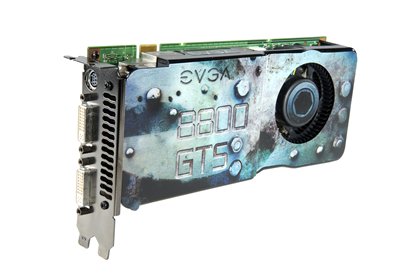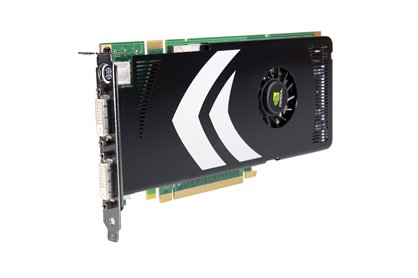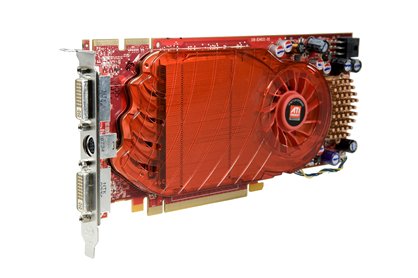The 2008 PC Builder's Bible
Find the best parts. Learn to build a rig from scratch and overclock it to kingdom come. PC Gamer shows you how
Now that they’ve cashed in on the early adopters, ATI and NVIDIA are going after the rest of us, with fast and inexpensive cards that do DirectX 10 – and beyond!

GeForce 8800 GTS 512MB $240, www.NVIDIA.com
Yet another variation on NVIDIA’s winning GeForce 8 series, the GTS 512MB is an excellent card whose terrific performance is simply overshadowed by the price/performance ratio of the 8800 GT. It’s a hefty card in the dual-slot form-factor of the 9800GX2 and 9800 GTX, but with a modest bump up in the core clock and only 512MB of texture memory, instead of 768MB (as well as a slightly narrower 256-bit pipe to squeeze frames through, compared to the 384-bit pipe of its two older brothers).
The extra forty bucks it costs over the cheaper 8800 GT doesn’t go to waste. Although the gains seem modest in the benchmark chart below—a few extra frames per second here, an extra 20 frames per second there—the differences become more prominent at higher resolutions and with higher levels of postprocessing (including filtering and antialiasing).

GeForce 8800 GT 512MB $200, www.NVIDIA.com
If you’ve got the bucks, then by all means, get yourself a GeForce 9800 GTX or a 9800GX2. But most of us are forced to cut corners every now and then on our PC upgrading budget. That’s what makes NVIDIA’s GeForce 8800 GT such a winner of a card: though it costs a lot less than the high end, and a hundred bucks less than the 8800 GTS 512MB version, its performance hardly plays like a second-tier card.
You can argue on and on about whether memory size, number of stream processors, or clock speed are more important in a videocard, but in the end, it’s the balance of all three that matters, and right now, you won’t find a more finely tuned card than the 8800 GT. It’s the one card we can recommend without reservation to gamers of all levels and budgets.

Radeon HD 3870 $170, www.ati.com
ATI now has a very serious competitor to the cards NVIDIA’s been dealing out to mid-range gamers in the HD 3870, a dual-slot card with a high 775MHz core clock speed and the 512MB of memory that a mid-range videocard deserves. It clocks in virtually neck-and-neck in Crysis and faster in Half-Life 2: Episode One compared to the GeForce 8800 GT, but gets winded and lags behind in RTS games like World in Conflict and Company of Heroes. Even then, we’re talking about differences of 10 to 15 frames per second, which looks less harsh when you consider that the MSRP on the HD 3870 is merely $170.
It doesn’t seem as finely tuned as the 8800 GT, and won’t appeal to as many different levels of gamers as that card does, but it’s fast, inexpensive, DirectX 10.1–compatible like the 3850—and well worth the extra $40 over that card. Plus, you can pair two of them up for some awesome Crossfire action!
Sign up to the GamesRadar+ Newsletter
Weekly digests, tales from the communities you love, and more
WINDOWS XP / WINDOWS VISTA
3DMark06 run at default resolution of 1280x1024; all other benchmarks run at 1600x1200 with 4x full-screen antialiasing and 16x anisotropic filtering enabled.
Name: GeForce 8800 GT
3DMark06: 11870/11641
Crysis: 17/13
Half-Life 2: Episode One: 129/131
World in Conflict: 33/28
Company of Heroes: 58/54
Name: GeForce 8800 GTS 512MB
3DMark06: 11976/11787
Crysis: 21/15
Half-Life 2: Episode One: 151/162
World in Conflict: 37/27
Company of Heroes: 59/55
Name: Radeon 3850
3DMark06: 10078/9280
Crysis: 13/8
Half-Life 2: Episode One: 124/129
World in Conflict: 16/35
Company of Heroes: 50/47
Name: Radeon 3870
3DMark06: 11462/10378
Crysis: 17/15
Half-Life 2: Episode One: 148/158
World in Conflict: 26/15
Company of Heroes: 58/42

Easy answers to common questions about your hard drive
Head back to the table of contents
PC Gamer is the global authority on PC games and has been covering PC gaming for more than 20 years. The site continue that legacy today with worldwide print editions and around-the-clock news, features, esports coverage, hardware testing, and game reviews on pcgamer.com, as well as the annual PC Gaming Show at E3.


